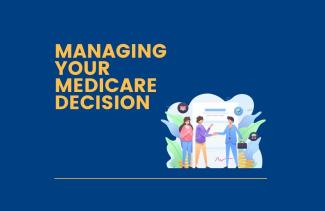
Managing Your Medicare Decision
Medicare is a big decision and there are many key factors that people should consider before making that decision. We suggest not making the decision on your own, but instead get some help from an industry professional. Don’t rely on what other people, friends, relatives, or family members have done. What was best for them may not be best for you and ultimately, it’s a choice that you may possibly have to feel comfortable with for over 30 years.
Medicare starts at age 65. It doesn’t matter when you start Social Security – the two are independent of each other. The only way someone’s eligible for Medicare prior to 65 is if they have a permanent disability. Once they collect disability for 2 years, they become eligible for Medicare.
Medical history does play a factor in to the products that someone would select. Someone with current medical problems or medical problems in the past would lean towards different products from those that have a clean health history. You will also want to consider what type of risk you wish to take on if something were to happen. There are different plans depending on how much out of pocket exposure you are willing to accept, should something happen.
The annual enrollment period for Medicare runs October 15th through December 7th. During that time, you can make just about any change you would like. The changes will take place for January 1st. Some plans will still need to go through medical underwriting. It’s not definite that you can make any change that you want, but it is the general time where you can evaluate your coverage and see if anything has changed with the plans. Also, if there are any changes in your health history, you will want to notify your agent to see if any new plans are available that may be a better fit. Insurance companies are always modifying plans and benefits.
Whenever someone elects into Medicare for the first time, whether they are turning 65 or if they work past 65 and come off their employer coverage, they have their own special window where they can never be turned down. The government will say it’s a 7-month window that starts 3 months prior to getting on Medicare (typically your 65th birthday), the month of, and then 3 months after. It also extends 6 months past getting on to Part B of Medicare. So, in that window, there’s no plan that can turn somebody down. They’re not even allowed to ask any health information on the application. Once that window passes, there are two main ways that you can obtain your medical coverage. 1) you can choose to have Medicare as your primary then choose a Medicare supplement or Medigap Plan (the terms are synonymous) or 2) you can choose to forego your Medicare benefits and choose a Medicare Advantage plan.
Usually when someone is already retired and they reach age 65 and are coming off an individual plan and going onto Medicare, they will save some money. But this is not the case for everyone since Medicare costs have gone up over the years. Currently, the standard cost for Medicare is $148.50 per month. Most people pay that based off income levels. Some people do pay less, some people do pay more. Right now, we’re in the middle of the Baby Boomer period and eventually we’re going to get out of that period. There are so many people that are electing Medicare every day, but that’s not always going to be the case. In the future, Medicare costs could go up because there are not as many people in the system.
We think it is best to speak with an industry expert on the different Medicare plans so they can provide the information and education to make an informed decision. If you are looking for help, please reach out and we can put you in touch with a professional that can help and not sell you something!
Tracking # 1-05199248

